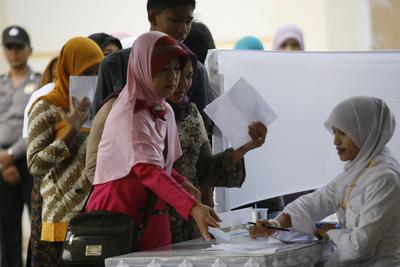They are therefore important providers of public goods and services, especially for the poor.
On average around 30 per cent of district budgets are absorbed by expenses for district administration, of which 85 per cent go to general government administration and the rest to other administrative functions, such as development planning, unity and local politics, or people and village empowerment (but not to sector administrations such as health or school administrations). This level is excessive by all international standards: administrative spending is double the districts’ average allocation for infrastructure (15 per cent) and the second-biggest budget item after education (34 per cent).
These high levels of administrative spending are persistent: even though Indonesia’s district budgets doubled between 2001–07, and have steeply increased thereafter, the share of administrative spending has declined only slightly since 2005. In absolute terms administrative spending per capita has sharply increased, which is remarkable since many spending items in this category have a strong fixed cost component. For instance, the expenditures for bupatis’ (regent) offices or for travel expenditures should increase only slightly with rising budget levels.
What explains these persistently excessive levels of administrative spending?
A recent study analyses this issue using data for 399 districts over the time period 2001–09. One line of explanation could be the emergence of new districts (pemekaran) and the need to establish new administrations. Yet, the evidence shows that the splitting of districts is not the reason for high spending levels. Newly created districts do not spend more per capita on administration during the start-up phase, only the composition of administrative expenditure is different. New districts have a higher share of capital expenditure and a lower share of staff expenditure as they still have to build up physical infrastructure and hire personnel.
A prime explanation is bureaucratic self-interest and a lack of accountability. Bureaucrats and local politicians profit from larger offices — both literally and in terms of the number of people employed — and from bigger budgets as they provide more convenience and more possibilities to employ family members or to accommodate the wishes of key allies and constituencies. This is true for all bureaus of the district government, but since a district’s central bureau is politically more powerful than the others it has better opportunities to lobby for big budgets and thus a greater propensity towards wasteful spending.
This administrative overspending is a wasteful activity as it directs funds away from the provision of public services towards uses that benefit the bureaucrats and politicians in power, but not the people. As such it constitutes a form of ‘legal corruption’ (the World Bank defines corruption as ‘misuse of public office for private gain’). Such waste can be avoided if governments are held accountable.
Decentralisation in Indonesia in 2001 replaced bureaucratic accountability to the central government with democratic accountability to the local electorate. If democratic accountability works at the local level, increasing democratisation should rein in the excessive administrative spending.
Two distinct steps towards more democratisation have taken place in Indonesia: the elections of district heads by the democratically elected local parliaments, and subsequently the direct elections of district heads by the local electorate. The incumbent district heads that had been appointed under Suharto were allowed to serve their full terms, which came to an end at different points in time. As a consequence, both steps took place at different times across the districts, making it easy to identify the increase in democratic circumstances. The study uses this circumstance to analyse whether democratisation has any impact on the size of administrative spending.Unfortunately, both democratisation steps did little to reduce the misallocation of resources.
Local party composition influences the extent of administrative overspending. In the sample of districts that did not split, for which the study has consistent data on local parliaments’ compositions, it finds that in districts with high political concentration or a dominant party, administrative overspending was even larger. In other words, political competition reduces the degree of waste.
These findings show that district governments are still not sufficiently accountable to the local constituency. Greater accountability would rein in excessive spending on themselves for the benefit of the people they are obliged to serve.
As such, decentralisation and democratisation at the local level are alone not sufficient for eliminating wasteful administration expenditure. Reform that improves political competition, including by increasing the transparency of the political process and making it easy for outsiders to run for office, is likely to be essential. Sensible next steps should include abolishing all barriers to entry for candidates to run for office of district head. This may lead to higher competitiveness of the political process, more freedom to choose, and thus better outcomes.
Dr. Günther G. Schulze is Professor of Economics at the Department of Economics, University of Freiburg, Germany.
Bambang Suharnoko Sjahrir is is a PhD student in the same department and works for the World Bank in Indonesia.
The views expressed in this article are those of the authors and do not necessarily reflect the views of the institutions they are affiliated with.


Is it such a big problem? Much worse if money was siphoned off into bank accounts. In a country with such a big under-employment problem, the fact that money is being used to create employment has some benefits.